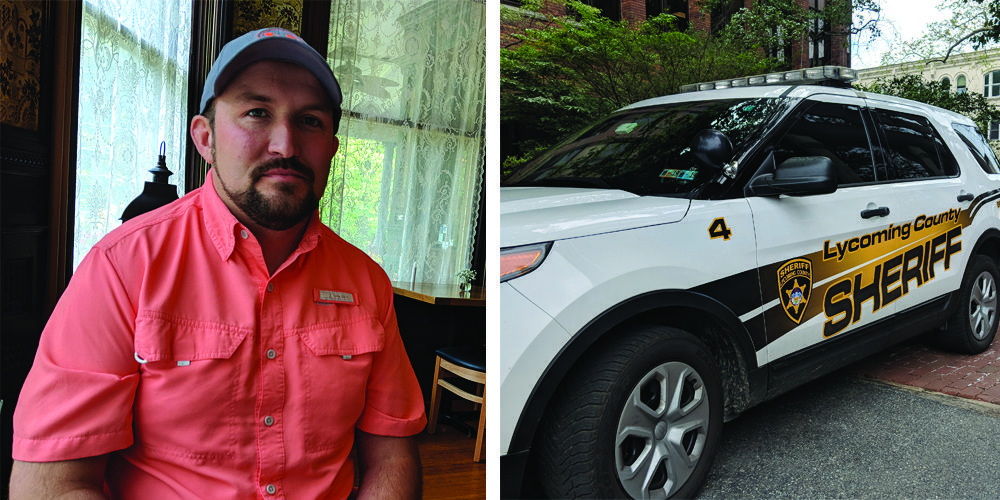
Three lawsuits against the Lycoming County Sheriff have topped $2 million with allegations of misuse of power and a violation of the 1st Amendment.
Shortly after a 2018 failed election bid for Lycoming County sheriff, Cogan House Township Constable Chad Riley filed a lawsuit against his once-opponent, Sheriff Mark Lusk.
The allegation: After the election, Lusk refused to provide Riley, and other constables who supported Riley’s campaign, with criminal warrants – their primary source of income.
“He has total autonomy and control and you’re not given any due process. And once you’re shut out, you’re completely shut out,” Riley said.
At the advice of his legal council, Lusk declined to comment in this article.
Riley and Mark Phillips, a constable who supported Riley’s campaign, have now filed three lawsuits against the sheriff, seeking over $2 million in damages. Two are in Lycoming County court and a third is filed with the U.S. Middle District Court as an allegation of 1st Amendment violation pertaining to free political speech.
A hearing is scheduled in the case for July 8 at the county courthouse.
The lawsuit claims that Lusk refused to provide Riley and Phillips with criminal warrants after Riley’s failed bid for sheriff.
Riley said he was let go from his contract with the sheriff due to political violations, saying he didn’t add “paid for by” to the bottom on his political sign.
“That has nothing to do with being a constable,” Riley said.
No additional paperwork was filed about disciplinary issues with either Phillips or Riley, according to the lawsuit, which also states Phillips was let go for health reasons, but no evidence of health issues was presented.
“I was under the impression I was doing a good job,” Phillips said. “I had worked for him for a few years.”
Constables’ primary duties, according to the state election code, are to provide security at municipal polling locations on election days, said Forrest Lehman, director of the county Voter Services. Additional work, like serving warrants for wanted individuals, is an extra service, which requires extra training, he added.
The outcome of the lawsuits will serve as a benchmark to clarify the role of a county sheriff in regard to constables, who also are elected. According to the state election code, constables report to the state governor and receive work directly from the county magisterial judges.
“There is no written, unwritten policy, there is no legal standing as to how they’re doing things,” Riley said.
Unlike many other counties in Pennsylvania, Lycoming County constables get the bulk of their warrants from the sheriff, not the magistrate, a change in process that happened after Lusk became sheriff in 2010.
The move was meant as a time- and cost-saving measure, according to Lycoming County President Judge Nancy Butts. Consolidating the criminal warrants under one office helped to cut down on back-log.
“To have a centralized office, my understanding, was always a good thing,” said Butts, who also is a witness in the case and could not speak about specific details of the lawsuit.
But the procedural shift didn’t sit well with some constables who said it’s a role the county sheriff was never meant to fill, nor had the authority to take on.
Constable Bill Welter worked as a Lycoming County constable for over 19 years, until 2018 when he was informed by the county deputy sheriff that his services were no longer needed.
Welter, like Riley and Phillips, said no reason was given. All three stopped receiving work for the sheriff’s office at the same time, however Welter opted not to take part in the lawsuit.
Welter said the procedural change for how warrants are processed came after Lusk took office, but he said no formal document was created or handed out to the constables.
“What he was changing wasn’t exactly legal,” Welter said, adding that he hopes the outcome of the lawsuit sets a precedent for how constables are treated across the state.
After the constables were let go, the lawsuit claims that Lusk told the magistrate judges to stop providing civil warrants to them as well.
In total, Phillips and Riley are seeking over $2 million in damages for lost wages as well as diminished future employment opportunities.
In an additional layer of controversy, the attorney for the constable’s lawsuit is Mary Kilgus, a former candidate for county district attorney and two bids for county judge. Kilgus lost her election attempts, but has drawn public outcry in the past for social media posts criticizing the 9/11 Memorial Motorcycle Ride and was investigated for misappropriating client funds through her private law firm.
Riley defended his decision to hire Kilgus, saying that her work on the case has been good. He added that she was one of the only attorneys they could find to take the case.
“We had a hard time even finding an attorney to touch it,” Riley said.



Really think this is a bunch of crap.You lost the election now you want revenge,You hire the only attorney you could find that should of been a clue you probably will not win your lawsuit.Waste of everyone’s time and tax payer money tying up the court system.